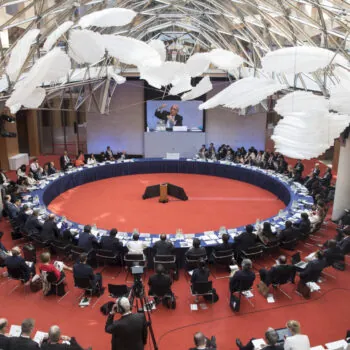Chris Huhne, the Energy & Climate Change Secretary, is being urged by an alliance of business, investors and NGOs to minimise energy costs by putting demand reduction at the heart of the White Paper, to be announced today.
- Driving energy bills down as global prices go up is an imperative for Britain’s businesses and consumers.
- This means DECC’s White Paper on Energy Market Reform must prioritise demand reduction over new generation.
- Vigorous demand reduction is by far the cheapest way to guarantee energy security while reducing carbon emissions.
Following the criticism that the Government’s new Energy Market Reform proposals will drive up consumer bills, an alliance of NGOs and businesses, which includes GE, National Grid and Cisco Systems, called on the Government to prioritise incentives for managing energy demand. [Note 1]
Making energy demand reduction a priority is a huge and necessary strategic shift,” said Nick Mabey, Chief Executive of E3G. “For twenty years the design of the electricity market has effectively blocked investment in the demand side. This has raised costs to consumers and increased our exposure to volatile global energy markets.”
Up until recently the Government has focused on developing measures to build new low carbon energy supply. A shift to prioritise demand reduction would demonstrate that the Government understands the opportunity it affords to minimise consumer bills and open up the market for new demand side businesses.
The business alliance is advocating ‘feed-in tariffs’ (long-term contracts that provide guaranteed revenue) for demand reduction is one of the solutions for demonstrating the Government is serious about putting energy demand management at the heart of the reforms. This would put them on an equivalent basis with the feed-in tariffs that the White Paper is likely to propose for new low carbon energy supply.
A focus on demand side investment is the only credible way to keep bills down while meeting the UK’s low carbon targets. Any increased dependency on simple gas-fired power stations risks repetition of the type of price rises seen this year, driven by the aftermath of Fukushima and political instability in the Middle East [Note 2].
There is no low cost, high carbon option,” continued Mabey. “Most of our power stations need replacing in the next 10 years and if the UK fails to build low carbon infrastructure, UK consumers will be held hostage to rising and volatile fossil fuel prices. The recent price hikes by British Gas are testament to that risk. But these price rises can be minimised by designing a market that incentivises a reduction in energy demand.”
Notes
1. Demand side is key to energy reform
Sir, The government is undertaking the biggest shake-up of the British electricity market since privatisation in 1990 and is due to publish its white paper on energy market reform next week.
However, one of the best opportunities to manage rising consumer energy bills could be lost if the government fails to implement reforms aimed at demand-side management, such as demand response and energy efficiency.
Increasing fossil fuel costs and a growing need for new investment in low carbon power are leading to increasing electricity prices. But the impact on consumers’ energy bills can be managed provided the government ensures energy efficiency and demand response measures are at the heart of energy market reform. This should include a commitment that long-term contracts and tariffs are offered for electricity demand reduction and not just for electricity supply.
If the government wants to protect consumers while moving towards a low carbon power system, it must ensure a fair and equivalent treatment for the demand side of the market.
Ed Matthew – Director, Transform UK
Magued Eldaief – Managing Director, GE Energy UK
Dimitri Zenghelis – Senior Economic Adviser, Cisco Systems
Steve Holliday – Chief Executive, National Grid
Ben Caldecott – Head of European Policy, Climate Change Capital
Graham Meeks – Director, Combined Heat & Power Association
Paul King – Chief Executive, UK Green Building Council
Jenny Saunders – Chief Executive, National Energy Action
John Sauven—Executive Director, Greenpeace
Nick Mabey—Chief Executive, E3G
http://www.ft.com/cms/s/0/6c4537e8-a8f8-11e0-ab62-00144feabdc0.html#axzz1RUrpMZHR
2. OfGem’s most recent supply report firmly attributed recent energy price rises to political instability impacting global fossil markets not the impact of green energy investment as claimed in some sources.
For more information: please contact
a. Nick Mabey, Chief Executive of E3G, 07949 768771
b. Ed Matthew, Director of Transform UK – investment for a clear energy future, 07827 157906


